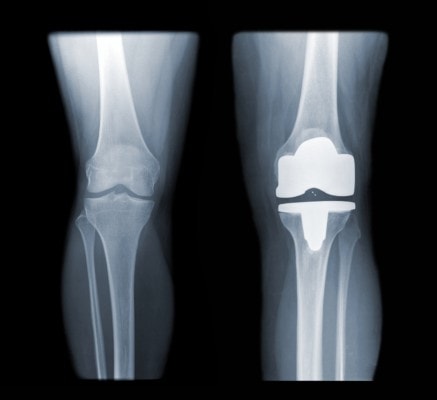Avoid Knee Replacement If You Have Allergies!
The idea that the metal we’re installing in people’s knees may be causing allergies has been talked about at many orthopedic conferences over the last few years. This is because of a growing realization that knee replacement can cause tissue reactions due to wear particles that shed off of these devices. Now a brand new research study is linking any reported allergy to worse knee replacement outcomes.

The knee on the right has been replaced. Skyhawk X/Shutterstock
A knee replacement is the amputation of a joint and insertion of prosthesis. That means that a piece of metal, ceramic, plastic, or some combination of these materials is installed. The fact that these devices are shedding wear particles has received a lot of attention lately. For example, we know that in some patients, metal ions from the knee replacement device can build up in the blood. In other patients who have a known jewelry allergy, the risk of being allergic to the metals used in these knee replacement devices is high. In addition to metals, some of the new plastics in knee replacement prostheses also cause allergies. If you are allergic, the device is more likely to fail, cause chronic pain, or need to be replaced sooner. Until now, it was assumed that allergy related issues were confined to those select patients, but the new study suggests that it may encompass all patients who have an allergy to anything.
About the Knee Replacement Allergy Study
The new study was out of Spain and involved hundreds of patients who underwent a knee replacement for arthritis. Roughly two thirds of the patients had no reported allergy on their medical chart, while about one third had a reported allergy. The group with at least one reported allergy fared worse in outcome scores than the group without any allergies.
Why is this happening? About 1/3 of us tend to have allergies and this may mean our immune systems are more “jacked up” than most people. Allergic people may be much more sensitive to having a foreign body shedding particles as it wears, causing their immune systems to attack the device. When your body rejects something, you can bet that swelling and pain will ensue, in addition to poorer bonding of bone to the device.
If you have a known allergy to something, you may want to think twice about getting a knee replacement to treat arthritis. While more research needs to be done, this study adds to the growing evidence base that what we implant into certain patients may not be compatible with their bodies!

NOTE: This blog post provides general information to help the reader better understand regenerative medicine, musculoskeletal health, and related subjects. All content provided in this blog, website, or any linked materials, including text, graphics, images, patient profiles, outcomes, and information, are not intended and should not be considered or used as a substitute for medical advice, diagnosis, or treatment. Please always consult with a professional and certified healthcare provider to discuss if a treatment is right for you.
